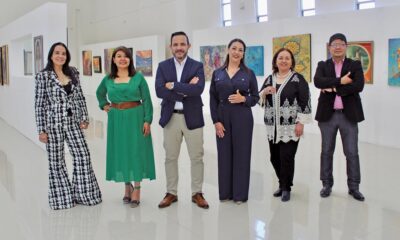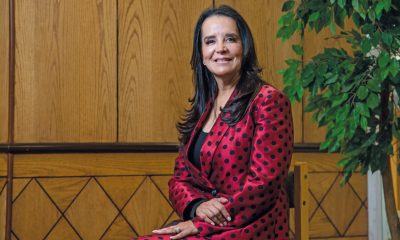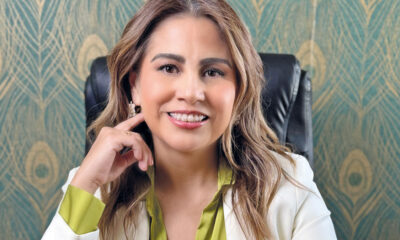El Diván
UACJ, fomenta el arte en la juventud
Publicado
2 años antesel
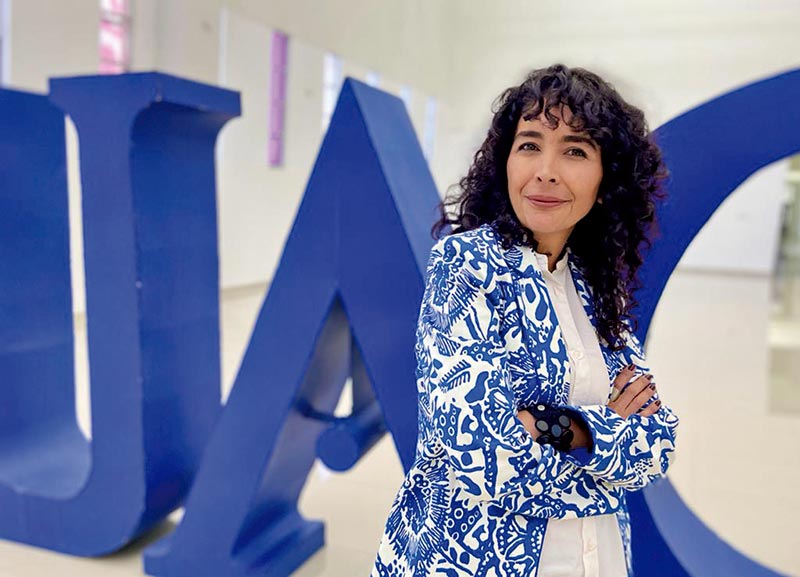
La mente visionaria de un grupo de mujeres ha convertido a la máxima casa de estudios juarense en un referente en el tema
En una ciudad compleja, alcanzada por un sinfín de problemáticas, el arte resulta un refugio que además de entretenimiento, da la libertad para expresar talentos y hacerse de una identidad propia.
En esta frontera, el refugio es el Centro Cultural de las Fronteras, un espacio donde convergen distintos tipos de arte, que son llevados a su máximo exponencial gracias al apoyo de la Universidad Autónoma de Ciudad Juárez (UACJ), la cual tiene a seis de sus mejores colaboradoras al frente de un proyecto que va más allá de las líneas divisorias.
Sobre los programas académicos, culturales y científicos de la máxima casa de estudios hablan para Visionarias Alpha Escobedo, Liliana Camargo, Daniela Gutiérrez, Hilda Monsiváis, Aracely Hidalgo y Ogla Lizeth Olivas, apasionadas mujeres, que aman lo que hacen y lo que son capaces de lograr gracias a su trabajo.
La universidad y la vida artística
Para darnos una idea de la importancia de la universidad en la vida artística de la frontera, la doctora Alpha Escobedo, orgullosa presume ser en la región “los principales productores de eventos artísticos y promotores de la cultura local y nacional”, que sólo en la actual administración ha registrado la participación de más de un millón de asistentes en todos los eventos presentados por la institución.
Increíblemente el mayor aumento de visitas y participantes en los eventos, que van desde bazares y exposiciones hasta conciertos de música instrumental, ocurrieron durante gran parte de la pandemia.
En esta etapa se implementaron varios programas, entre ellos Cultura en Red que por medios digitales atrajo a más público que en eventos presenciales, demostrando así la importancia que tienen las actividades de la universidad.
Alpha comparte que durante la emergencia sanitaria que detuvo la vida social en todo el mundo, se observó que el arte y la cultura patrocinados por la UACJ, fueron los que aminoraron los momentos de ocio, “son actividades que nos llenan el alma en nuestros momentos más difíciles, entonces eso nos llena de orgullo, ser la casa productora de arte más grande, más sólida de la región”, comenta emocionada.
Precisamente tras ser testigos de los alcances que tiene la universidad es que se han propuesto ampliar sus alcances, tal y como lo hacen año con año. Actualmente los programas artísticos y culturales de esta institución llegan a toda América Latina y gran parte de Estados Unidos, donde es la población mexicoamericana la más interesada en todo lo que ofrece la institución.
Pueblos y lenguas originarias también tienen cabida.
Centro Cultural de las Fronteras
Pero poner el arte al alcance de todos o presentar el trabajo de talentosos seres no sería posible sin el escenario perfecto para que la magia suceda, es por eso que en el corazón del Pronaf se edificó el Centro Cultual de las Fronteras, un lugar que como la misma institución describe es un espacio dedicado al arte, la ciencia y la cultura que alberga el trabajo y las expresiones artísticas de la comunidad, al tiempo que fomenta la divulgación científica del trabajo académico y cultural.
Aquí existen los espacios ideales para las diferentes disciplinas, además de una librería, cine y una cafetería. El 98% de las actividades que aquí se llevan a cabo son gratuitas y aquellas que llegan a tener un costo realmente son muy accesibles.
En el Centro Cultural de las Fronteras los espacios se prestan a toda la comunidad, misma que cuenta con el apoyo necesario en todas las áreas.
“Aquí convergen todos los creadores y personas involucradas en gestionar y desarrollar cada proyecto”, comentan las entrevistadas.
Juárez, un referente
Ante la pregunta directa de si Ciudad Juárez es un referente de arte, Daniela Gutiérrez no dudó ni un instante en asegurar que sí, respuesta que fue secundada por Hilda Monsiváis, quien aseguró que más allá de un programa que alberga y apoya a una serie de proyectos, han logrado formar una comunidad importante.
Gutiérrez agrega que como institución trabajan siempre en colaboración con los tres niveles de gobierno y la iniciativa privada, y que también son parte de la red de museos y centros culturales, con los cuales unen sus recursos.
Lo anterior lo han conseguido siendo fieles a los tres aspectos principales de este gran proyecto: la mejora en la calidad de vida en función de la convivencia para la paz, la construcción de una identidad critica y la aportación a la comunidad de la resolución creativa de los problemas, pilares que han quedado claros en todos y cada uno de los 900 eventos que se llevaron a cabo sólo en el 2022 y que se espera sean rebasados en el año que estamos cursando y en el que se está apostando por el fomento a la lectura y la apertura de nuevos talleres, sin descuidar todo aquello por lo que han venido trabajando, porque como lo dice Alpha: El arte ayuda en la mejora de la calidad de vida.
“Ahora en la pandemia (el arte) nos ayudó a concientizarnos más, a pensar… el mismo encierro nos hizo adentrarnos y la música (y otras disciplinas) fue un medio que nos ayudó a ser más consientes y ser mejores personas, el arte nos ayuda a tener paz siempre que lo necesitemos”, sentencia Liliana Camargo.
¿Quién es quién?
Alpha Escobedo
En la estructura artística de la máxima casa de estudios juarense, la doctora Escobedo, es quien lleva las riendas de la Dirección General de Divulgación Cultural y Científica, a través de la cual coordina programas y establece, junto con Rectoría, las metas institucionales y los objetivos principales de cada programa.
Liliana Camargo
Es la encargada de la Jefatura de Proyectos Orquestales, quien se encarga de organizar los conciertos de la Orquesta Sinfónica Juvenil y del Ensamble Clásico de Cuerdas de la universidad.
Daniela Gutiérrez
El contacto con los artistas lo tiene la titular de la Jefatura de Proyectos Expositivos; es ella quien se ocupa de asignar el espacio idóneo para que los talentos que aquí se dan cita puedan montar sus exposiciones, las cuales van desde arte hasta ciencia.
Hilda Monsiváis
Al frente de la Jefatura de Formación y de la Creación de Públicos, ella organiza los talleres que fomentan el disfrute del arte y el conocimiento de todo lo que hay alrededor de cualquier disciplina artística, mismos que son gratuitos.
Aracely Hidalgo
Del área de Formación y Creación de Públicos, Aracely está al frente de las visitas guiadas a las escuelas de todos los niveles para promocionar y dar a conocer el Centro Cultural de las Fronteras, con la encomienda de que los menores se sepan qué es lo que es este lugar se hace, es decir, trabaja en socializar y visibilizar el trabajo de todas las demás áreas.
También es parte del programa de fomento de lectura que en los últimos años ha tenido un crecimiento muy grande.
Ogla Lizeth Olivas
La coordinadora académica en Bellas Artes diseña programas multidisciplinarios que invite a más personas a unirse a las actividades que la universidad ofrece. También actualiza el programa curricular de la misma y está a cargo de 100 maestros y nueve academias.
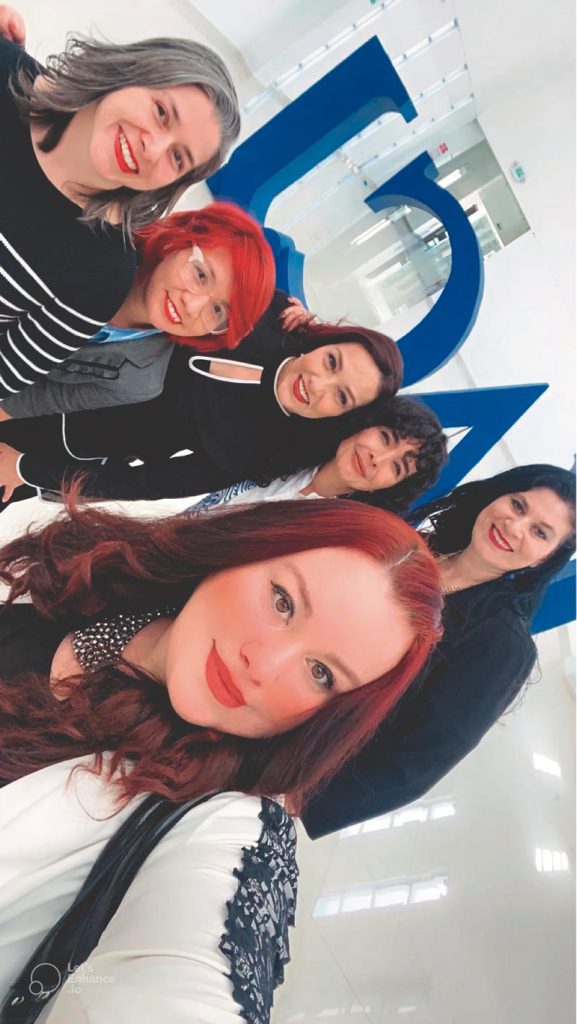
UACJ promotes the art in youth
The visionary mind of a women’s group has turned the maximum house of studies in Juarez into an art reference
In a complex city affected by myriad problems, art is a refuge that, in addition to entertainment, gives the freedom to express talents and make an identity of its own.
On this border, the refuge is the Centro Cultural de las Fronteras. Different types of art converge in this space, which is taken to their maximum exponential thanks to the support of the Universidad Autónoma de Ciudad Juárez (UACJ), which has six of its best collaborators at the head of a project that goes beyond the dividing lines.
Alpha Escobedo, Liliana Camargo, Daniela Gutiérrez, Hilda Monsiváis, Aracely Hidalgo and Ogla Lizeth Olivas, passionate women who love what they do and what they can achieve thanks to their work, speak about the academic and cultural and scientific programs of the university for Visionarias.
The University and artistic life
To give us an idea of the importance of the University in the artistic life of the border, Dr. Alpha Escobedo proudly boasts of being in the region “the main producers of artistic events and promoters of local and national culture,” which only in the current administration has registered the participation of more than one million attendees in all events presented by the institution.
The most significant increase in visits and event participants, ranging from bazaars and exhibitions to instrumental music concerts, occurred during much of the pandemic.
Several programs were implemented at this stage, including Networked Culture, which attracted more people through digital media than in-person events, demonstrating the importance of the university’s activities.
Alpha shares that during the health emergency that stopped social life around the world, it was observed that art and culture sponsored by the UACJ were the ones that lessened the moments of leisure, “are activities that fill our souls in our most difficult moments, then that fills us with pride, to be the largest producer of art, more solid in the region,” she says excitedly.
Precisely after witnessing the university’s scope, they have proposed to expand its scope, as they do year after year. Currently, this institution’s artistic and cultural programs reach all of Latin America and a large part of the United States, where the Mexican-American population is the most interested in everything the institution offers.
Native peoples and languages also have a place.
Cultural Center of the Borders
But making art available to everyone or presenting the work of talented people would not be possible without the perfect setting for the magic to happen, which is why the Centro Cultural de las Fronteras was built in the heart of Pronaf, a place that, as the institution itself describes, is a space dedicated to art, science and culture that houses the work and artistic expressions of the community, while promoting the scientific dissemination of academic and cultural work.
There are the ideal spaces for the different disciplines, including a bookstore, cinema and cafeteria. Ninety-eight percent of the activities here are free of charge, and those with a cost are very accessible.
At the Centro Cultural de las Fronteras the spaces are available to the entire community, which has the necessary support in all areas.
“Here, converge all the creators and people involved in managing and developing each project,” commented the interviewees.
Juarez, a reference
When asked if Ciudad Juarez is a reference point for art, Daniela Gutierrez did not hesitate to say yes, an answer seconded by Hilda Monsivais, who said that beyond a program that hosts and supports a series of projects, they have managed to form an important community.
Gutiérrez added that as an institution, they always collaborate with the three levels of government and the private sector and are also part of the network of museums and cultural centers with which they pool their resources.
This has been achieved by being faithful to the three main aspects of this great project: The improvement in the quality of life in terms of coexistence for peace, the construction of a critical identity and the contribution to the community of creative problem-solving, pillars that have been clear in every one of the 900 events that took place only in 2022 and that are expected to be exceeded in the year we are going through and in which they are betting on the promotion of reading and the opening of new workshops, without neglecting everything they have been working for, because as Alpha says: Art helps in improving the quality of life.
“Now in the pandemic (art) helped us to become more aware, to think… the same confinement made us enter, and music (and other disciplines) was a means that helped us to be more aware and be better people, art helps us to have peace whenever we need it,” says Liliana Camargo.
Who is who?
Alpha Escobedo
In the artistic structure of the university, Dr. Escobedo is in charge of the General Direction of Cultural and Scientific Dissemination, through which she coordinates programs and establishes, together with the Rector’s Office, the institutional goals and main objectives of each program.
Liliana Camargo
Liliana Camargo is in charge of the Orchestral Projects Department, which organizes the university’s Youth Symphony Orchestra and the Classical String Ensemble concerts.
Daniela Gutiérrez
The contact with the artists is the responsibility of the Head of Exhibition Projects, who is in charge of assigning the ideal space so that the talents that gather here can mount their exhibitions, which range from art to science.
Hilda Monsiváis
Head of the Training and Audience Creation Department, she organizes workshops that promote the enjoyment of art and the knowledge of everything around any artistic discipline, free of charge.
Aracely Hidalgo
In the area of Training and Audience Creation, Aracely is in charge of guided visits to schools of all levels to promote and publicize the Centro Cultural de las Fronteras so that children know what this place does, that is to say, she works to socialize and make visible the work of all the other areas.
It is also part of the reading promotion program, which has had significant growth in the last few years.
Ogla Lizeth Olivas
The academic coordinator at Bellas Artes designs multidisciplinary programs that invite more people to join the activities offered by the university. She also updates the curricular program and oversees 100 teachers and nine academies.
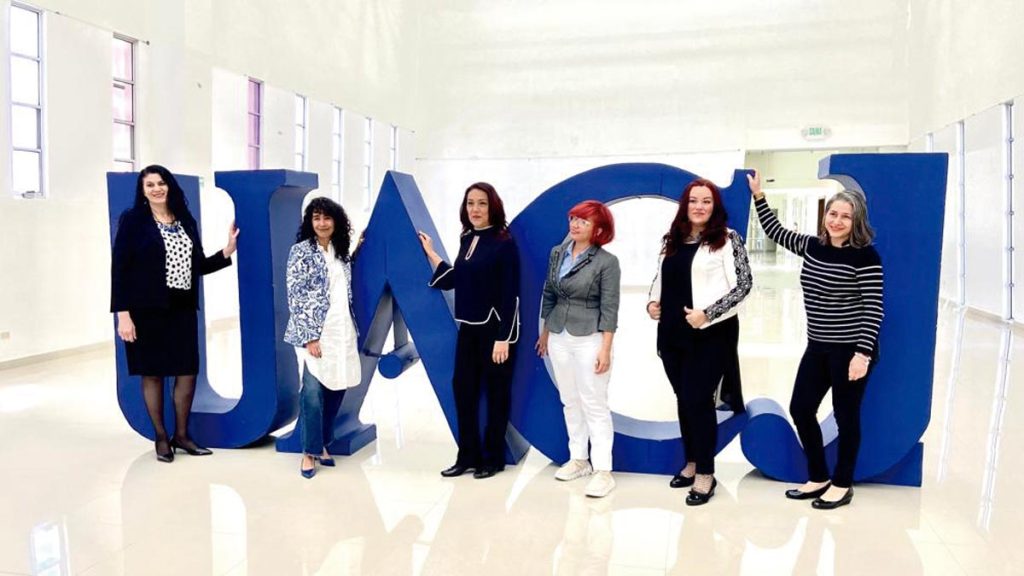
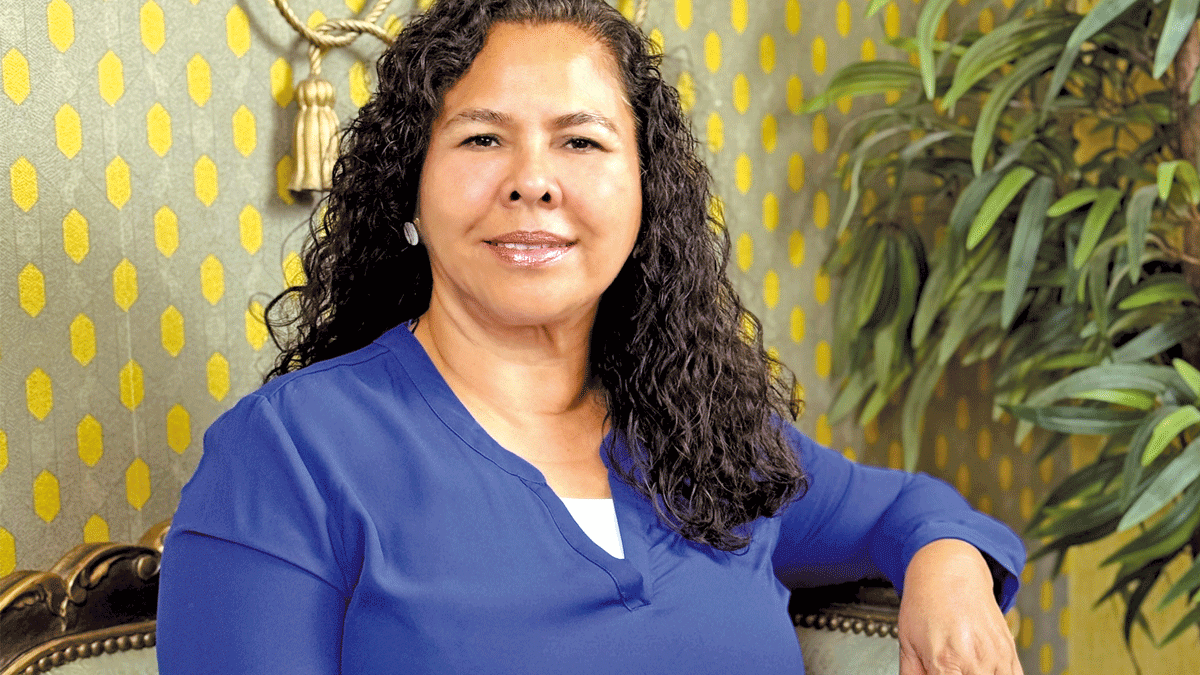
En una nueva etapa, la fundadora de Vida Integral para la Mujer A.C. cuenta sobre el trabajo que hace a favor de las víctimas de violencia y sus hijos
Con el objetivo de proteger y apoyar a mujeres víctimas de violencias extremas, así como a sus hijas e hijos, ofreciéndoles refugio, atención psicológica, asesoría jurídica y otras herramientas para salir adelante, es que fue creado Vida Integral para la Mujer A.C., que está comenzando una nueva etapa en su historia.
De la mano de su directora y fundadora, Lilia Aurora Pacheco, Vida Integral para la Mujer deja de percibir apoyos gubernamentales para así poder dar una ayuda espiritual libre a quienes se acercan en busca no sólo de protección, si no de un espacio donde puedan iniciar una vida normal, incluso tomar talleres que les sirvan para subsistir económicamente, siempre tomadas de la mano de Dios.
Lo anterior, nos cuenta Lilia, se pone en marcha a través de los grupos “A Corazón Abierto” de ayuda mutua y conocimiento en Cristo.
‘Creer en Dios’
Pero todo el trabajo que esta institución se realiza no es de hoy, han sido años de labor constante de una mujer visionaria, quien, tras superar el cáncer de tiroides hace más de dos décadas, decidió salvar a otras mujeres, siguiendo también el ejemplo de su madre Ofelia, “una mujer muy valiente, ella fue quien me enseñó a creer en Dios”, nos cuenta.
Por ella es que “estoy intentando por medio del refugio seguir salvando las vidas de las mujeres, los niños y las niñas que sufren violencia, y también a la comunidad”, comenta la madre de una hija y abuela de dos pequeños.
Refugio y centro externo
Lilia nos comparte que el trabajo en el refugio consiste en recibir a las víctimas en un lugar seguro, con una dirección confidencial, ya sea que lleguen por cuenta propia o canalizadas por medio de alguna fiscalía, hospital, iglesia o cualquier otra institución que sabe del trabajo que ellos realizan. Además, pertenecen a la Red Nacional de Refugios.
Las mujeres que se acercan padecen violencia desde física, económica, psicológica y hasta obstetra, que hasta no hace muchos años no era tomada en cuenta.
Otro de los ejes importantes de Vida Integral para la Mujer A. C. es el centro externo, ubicado en la colonia Salvárcar y abierto para ayudar a la comunidad en general en diversos temas, uno de ellos es el jurídico, para lo cual cuentan con abogados que dan seguimiento y acompañamiento en casos donde se requiera de asesoría legal.
“Por una vida que salves, salvas a una mujer y sus generaciones”, menciona nuestra entrevistada, quien también acepta que no siempre se logra el cometido, pues para algunas mujeres es difícil salir de la zona de agresión.
“Como mujer ha sido muy frustrante que la mujer no se valora, que tú les das tres seis meses de tu vida, contante, y si Dios no está ahí no puede abrir su entendimiento sola… Donde Dios no está no hay soluciones”, pero agrega que es por las historias de éxito es que ella continúa su labor.
Por ahora Lilia Pacheco continúa trabajando por el bien de las mujeres y sus hijos, en esta nueva etapa con el cobijo de Dios, quien dice ha sido bueno y ha tenido misericordia de ella, dice, “(sin él) no podemos hacer nada”, tal cual se lo enseñó su madre, quien también le hizo ver que es una hija de Dios.
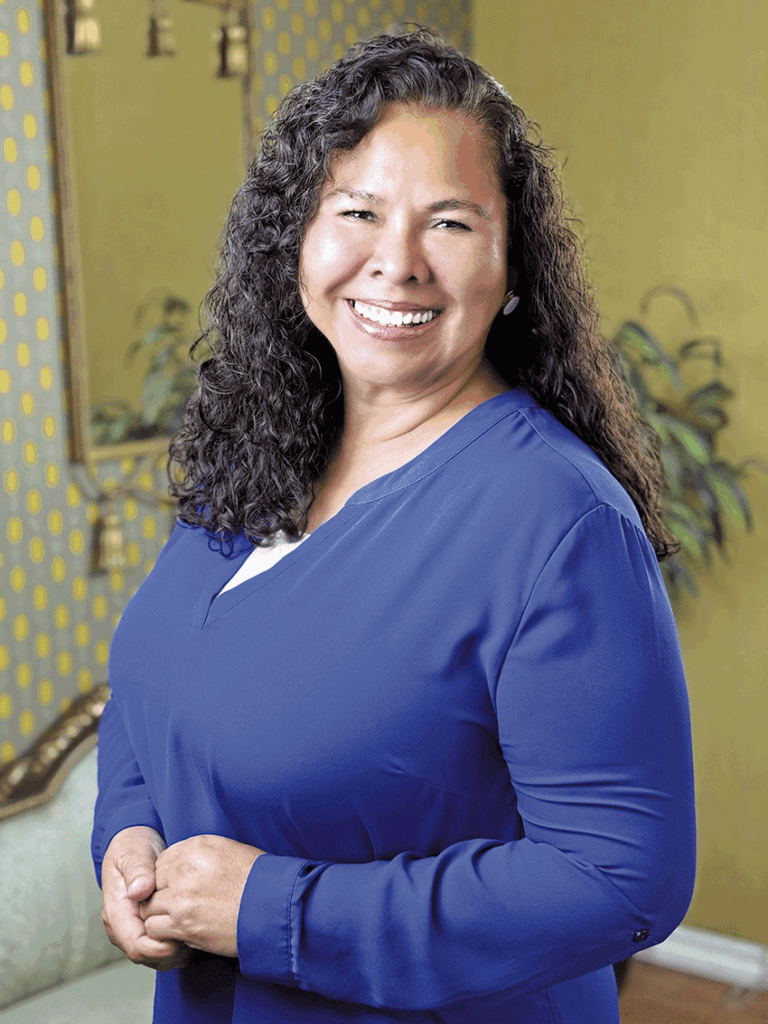
A Daughter of God
In a new chapter, the founder of Vida Integral para la Mujer A.C. shares the work she carries out to support victims of violence and their children.
With the mission of protecting and supporting women who have experienced extreme violence—as well as their daughters and sons—Vida Integral para la Mujer A.C. was created to offer shelter, psychological care, legal advice, and other tools to help them move forward. Now, the organization is entering a new stage in its journey.
Under the leadership of its director and founder, Lilia Aurora Pacheco, Vida Integral para la Mujer is stepping away from government funding in order to offer free spiritual support to those seeking not only protection, but also a space where they can begin a normal life. This includes access to workshops that help them become financially self-sufficient—always with their hand in God’s.
This new approach, Lilia tells us, is being carried out through the mutual support and faith-based learning groups called “A Corazon Abierto” (With an Open Heart).
‘Believing in God’
But this work didn’t begin yesterday. It has been years of continuous effort by a visionary woman who, after overcoming thyroid cancer more than two decades ago, decided to devote herself to saving other women—following the example of her mother, Ofelia.
“She was a very brave woman, and the one who taught me to believe in God,” Lilia tells us.
Because of her mother, “I’m trying—through this shelter—to continue saving the lives of women, children, and even the community,” says the mother of one daughter and grandmother of two young children.
Shelter and External Center
Lilia explains that the shelter’s work consists of welcoming victims into a secure and confidential location—whether they arrive on their own or are referred by prosecutors’ offices, hospitals, churches, or any other institutions familiar with their work. They are also a part of the National Network of Shelters in Mexico.
The women they serve experience many forms of violence: physical, economic, psychological, and even obstetric violence, a type that only recently has begun to receive recognition.
Another key component of Vida Integral para la Mujer A.C. is its external community center, located in the Salvarcar neighborhood. It serves the broader community, offering support on a variety of issues—one of the most crucial being legal assistance. The center has lawyers available to provide follow-up and accompaniment in cases requiring legal guidance.
“By saving one life, you save a woman and her generations,” says Lilia. She also acknowledges that not every case ends in success—some women struggle to leave the abusive environments they’re in.
“As a woman, it’s frustrating to see that some women don’t value themselves—that you give them three or six months of your life, constantly—and if God is not there, they cannot come to understand on their own… Where God is not present, there are no solutions,” she says. Still, it’s the stories of success that keep her going.
For now, Lilia Pacheco continues her work for the well-being of women and their children, in this new stage under God’s care—who, she says, has been good and merciful to her.
“Without Him, we can do nothing,” she affirms, just as her mother taught her—along with the truth that she is a daughter of God.
“In this world you will have trouble but take heart; I have overcome the world.”
John 16:33
El Diván
Innovación con propósito: la historia de Ramón Chávez y SPD
Publicado
1 mes antesel
03/06/2025
En el corazón de la industria alimentaria, donde la eficiencia, la seguridad y la innovación se entrelazan, SPD, Servicios Profesionales Diversificados, es una compañía que ha evolucionado desde ofrecer servicios de mantenimiento técnico, hasta convertirse en un referente en soluciones integrales para cocinas industriales, restaurantes y la industria hotelera.
Ramón Chávez, de 38 años de edad, originario de Parral, Chihuahua, es ingeniero electromecánico y empresario exitoso en nuestra frontera. Él junto a su socio Alfonso Santillan han logrado construir algo más que la empresa SPD, han dado forma a una visión compartida a lo largo de más de 20 años de trabajo constante.
Sin embargo, más allá del empresario, hay un padre y esposo que ha aprendido a equilibrar los retos del liderazgo, con su vida familiar. A su lado están su esposa, Yael y sus tres hijos: Ramón, René y Regina. Juntos forman un equipo unido, con valores firmes y una fe profunda en Dios, que los sostiene en cada paso.
“Mi mayor reto no ha sido construir una empresa, sino ser cabeza de hogar”, afirma con sinceridad.
Su fe en Dios, es su motor
Para Ramón, su fe en Dios es el motor que lo impulsa cada día y el fundamento sobre el cual ha edificado tanto su familia como su empresa.
Recientemente, en una charla con uno de sus hijos, le preguntó: ¿Qué crees que importa más, la fama o el dinero? él respondió con convicción: “Es mejor confiar en Dios, y lograrás todo en tú vida”. Esa respuesta refleja lo que Ramón ha sembrado: una vida guiada por la fe, con propósito y con identidad clara. Porque más allá del éxito empresarial, su verdadero legado es espiritual y humano.
Consejo para los hombres, cabeza del hogar
“A los padres, a los hombres que lideran un hogar: tengan identidad, no se confundan con lo que el mundo dicta. Tomen con valentía el lugar que les corresponde, no solo como proveedores, sino como líderes con propósito”, declaró.
Además, recomendó soñar en grande, pero con los pies en la tierra y el corazón puesto en las manos del Señor. Advirtió que no será fácil, pues habrá días de lucha, de dudas, de cansancio, pero todo es posible para él que cree.
“A su tiempo, todo llega. Y cuando llegue, entenderás que valió la pena poner toda tú confianza en Dios”, mencionó Chávez.
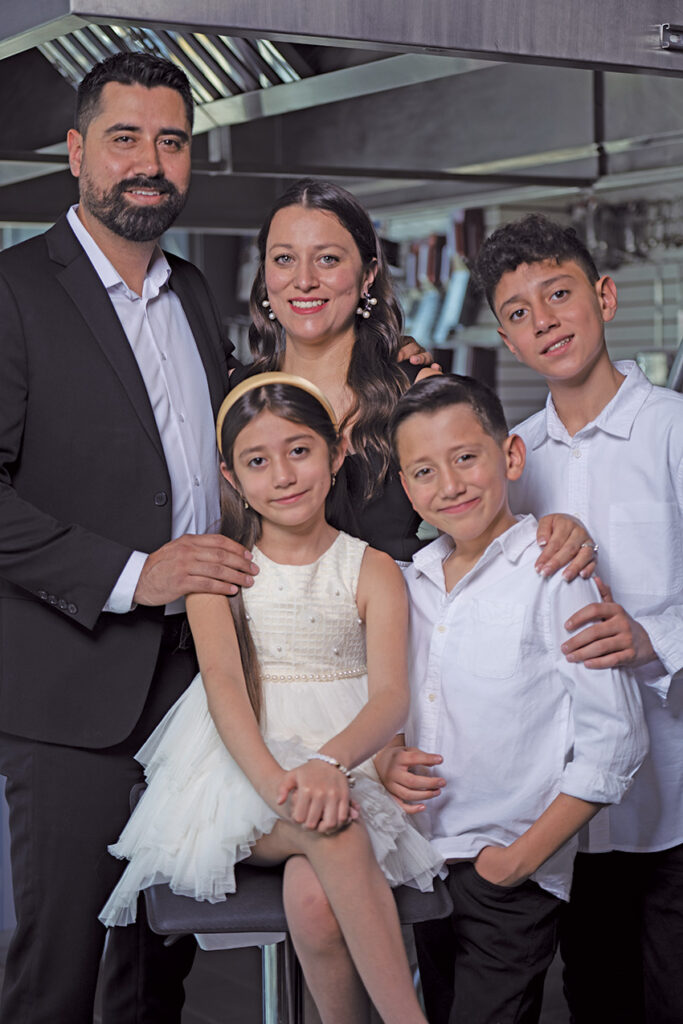
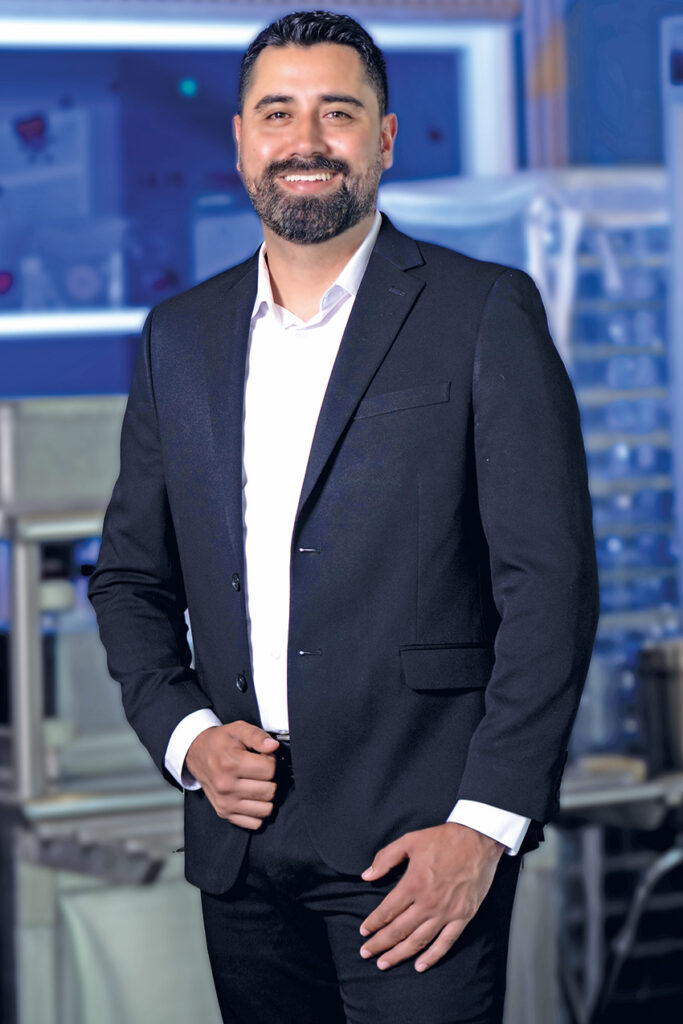
Innovation with Purpose: The Story of Ramon Chavez and SPD
At the heart of the food industry, where efficiency, safety, and innovation intertwine, SPD, Diversified Professional Services, is a company that has evolved from offering technical maintenance services to becoming a leader in comprehensive solutions for industrial kitchens, restaurants, and the hospitality industry.
Ramon Chavez, 38, originally from Parral, Chihuahua, is an electromechanical engineer and successful entrepreneur on our border. Along with his partner, Alfonso Santillan, they have managed to build more than just the company SPD; they have shaped a shared vision over more than 20 years of constant work.
However, beyond the entrepreneur, there is a father and husband who has learned to balance the challenges of leadership with his family life. By his side are his wife, Yael, and their three children: Ramon, Rene, and Regina. Together they form a united team, with strong values and a deep faith in God, which sustains them every step of the way.
“My greatest challenge hasn’t been building a business, but being the head of a household,” he says sincerely.
His Faith in God Is His Driving Force
For Ramon, his faith in God is the driving force that drives him every day and the foundation upon which he has built both his family and his business.
Recently, in a conversation with one of his sons, he asked him: “What do you think is more important, fame or money?” He replied with conviction: “It’s better to trust in God, and you will achieve everything in your life.” That answer reflects what Ramon has sown: a life guided by faith, with purpose and a clear identity. Because beyond business success, his true legacy is spiritual and human.
Advice for Men, Heads of the Household
“To fathers, to men who lead a home: have an identity, don’t be confused by what the world dictates. Courageously take your rightful place, not only as providers, but as purposeful leaders,” he declared.
He also recommended dreaming big, but with your feet on the ground and your heart placed in the hands of the Lord. He warned that it won’t be easy, as there will be days of struggle, doubt, and fatigue, but everything is possible for those who believe.
“In due time, everything comes. And when it comes, you’ll understand that it was worth it to put all your trust in God,” Chavez said.
El Diván
Judith Weber: Un corazón de servicio
Publicado
2 meses antesel
05/05/2025Por
Luz María Sotelo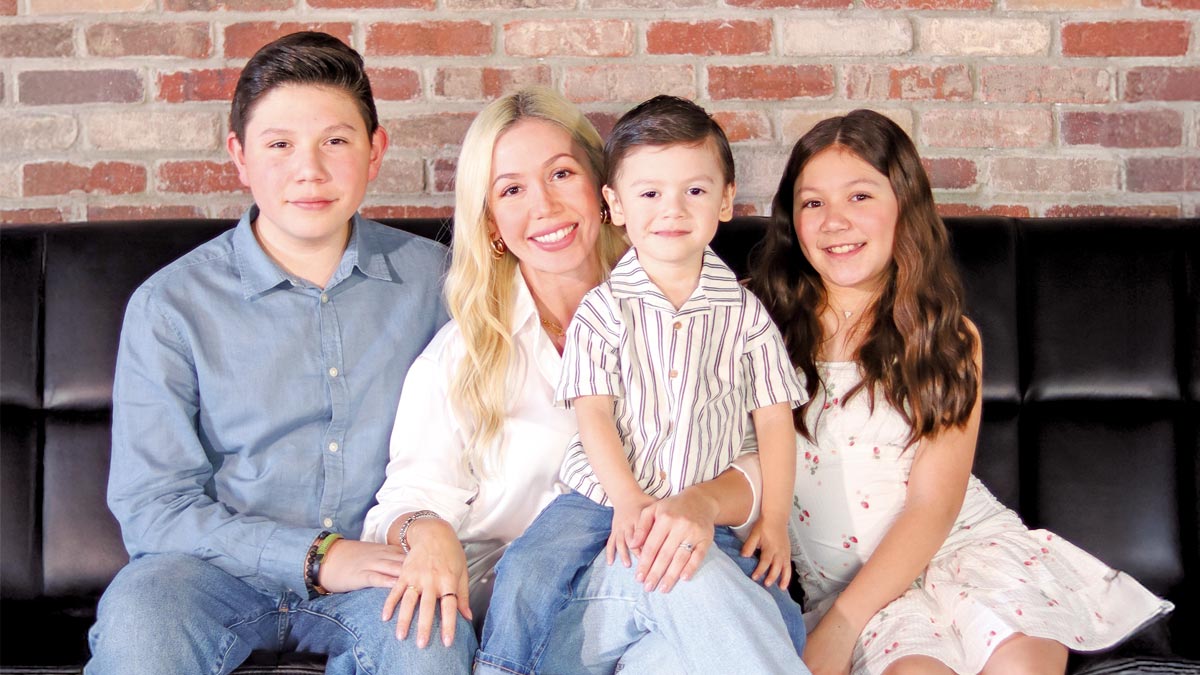
Nacida en el núcleo de una familia cristiana, esta Mujer Visionaria comparte el mensaje de Dios con la comunidad que ama
Con la bendición de nacer y crecer en un hogar cristiano, Judith Weber siempre ha caminado tomada de la mano de Dios, quien le ha dado la encomienda de formar una familia y ministrar una iglesia al lado de su compañero de vida, el pastor Rudy Weber.
En entrevista con Visionarias, Judith recuerda su vida al lado de sus padres y abuelo, un misionero que predicó la palabra hasta su último suspiro, además de su vida en matrimonio, la conexión con sus hijos y el trabajo con la comunidad que ahora ella también pastorea.
Juntos desde la infancia
Judith conoció a su esposo en la iglesia cuando ella tenía 13 años y cursaba high school, mientras él ya era un estudiante universitario, por lo que sólo lo veía como el hijo del pastor.
Fue al pasar de los años, cuando cumplió 18 y él 23 que comenzaron una relación amorosa en una primera etapa que únicamente duró tres meses, pues Rodolfo decidió terminar el noviazgo para enfocarse en el ministerio juvenil que lideraba.
Sin embargo, Dios tenía otros planes para la joven pareja, pues nueve meses después regresaron para durar 5 años de novios y luego dar el gran paso, casarse, de eso pronto se cumplirán 16 años.
Landen, Alessandra y Luka
A sus 38 años, esta Mujer Visionaria es madre de tres hijos.
El primero en llegar a la familia de Judith y Rudy fue Landen, quien hoy tiene 13 años y según su madre “es un niño muy noble, sonriente, ocurrente y tranquilo que piensa muy maduramente cuando se trata de las cosas de Dios”.
Luego nacería Alessandra, quien nos dice es una niña de 11 años muy fuerte y ayuda mucho en casa, “es una mamá chiquita, toma el rol de ayudarme en la casa con Luka, ella sabe sus necesidades, (y también) ama la iglesia”.
Y sobre Luka, Judith nos comparte que Dios lo mandó en el momento correcto, “es una luz en la casa” que hoy en día tiene 3 años.
“Ser mamá es la bendición más grande. Verlos crecer es algo muy especial”, dice.
“Los viernes son viernes de familia, ese día procuramos dedicárselo a ellos. Cine, cenar, estar en casa y ver películas, una carne asada, juegos de mesa; cada viernes algo diferente, pero escogemos hacer algo con ellos y pasar tiempo los cinco solos. Enfocarnos en ellos y darles el 100 por ciento de nuestra atención, esos días valen oro”.
Continúa, “aún sigo aprendiendo cómo navegar mi vida como madre, esposa y pastora… (Salmo 139:13-14) Mi meta como mamá es que amen a Dios por sobre todas las cosas y crezcan para ser personas que agraden a Dios en todo lo que hagan, recordarles quien es Jesús en nuestras vidas”, platica Judith.
Roca Church
Sobre tomar un papel más importante en el ministerio ella dice tener muchas respuestas, aunque sólo nos comenta que al principio únicamente estaba involucrada en la alabanza y los jóvenes, pero en el año 2020, durante el proceso de instalación como pastores principales de Roca Church, comenzó a sentir que Dios la llamaba más al ministerio.
“Me siento contenta de poder dirigir una iglesia, el llamado de pastorear no es para todos, es un llamado el de ser pastores, no es fácil, tenemos nuestras altas y bajas, nuestros tiempos buenos, nuestros tiempos malos, pero siempre nos agarramos de Dios para poder asegurarnos de que, estamos haciendo la voluntad de Dios”, menciona.
Dice que mientras ella está en la alabanza y ministra a su manera, su esposo es el que predica, “funcionamos con diferentes roles en el ministerio, pero estamos dirigidos a la misma meta… cumplir el propósito de Dios que es construir la iglesia”.
“Mi rol en la iglesia ahorita tiene muchos papeles, y está bien”, dice Judith quien se encarga de que los ministerios funcionen y los voluntarios tengan las cosas que necesitan, pues ella ayuda a que las cosas sucedan, teniendo la comunicación como su mejor herramienta, por lo que su nueva visión es crear comunidad a través de los grupos Conecta, para que esa misma gente traiga más personas que se unan a Roca, una familia convertida en iglesia.

Judith Weber: A Heart of Service
Born into a Christian family, this Visionary Woman shares God’s message with the community she loves.
Blessed with being born and raised in a Christian home, Judith Weber has always walked hand in hand with God, who has entrusted her with the task of raising a family and ministering a church alongside her life partner, Pastor Rudy Weber.
In an interview with Visionarias, Judith recalls her life alongside her parents and grandfather, a missionary who preached the word until his last breath, as well as her married life, her connection with her children, and her work with the community she now also pastors.
Together Since Childhood
Judith met her husband at church when she was 13 and in high school, while he was already a college student, so she only saw him as the pastor’s son.
Over the years, when she turned 18 and he turned 23, they began a romantic relationship. Initially, it only lasted three months, when Rodolfo decided to end their relationship to focus on the youth ministry he led.
However, God had other plans for the young couple. Nine months later, they returned to courtship for five years and then took the big step: marriage. That will soon mark 16 years.
Landen, Alessandra, and Luka
At 38 years old, this visionary woman is the mother of three children.
The first to join Judith and Rudy’s family was Landen, who is now 13 years old and, according to his mother, “is a very noble, smiling, witty, and calm boy who thinks very maturely when it comes to the things of God.”
Then came Alessandra, who, she says, is a very strong 11-year-old girl and helps a lot at home. “She’s a little mom. She takes on the role of helping me around the house with Luka. She knows his needs, and she also loves church.”
And about Luka, Judith shares that God sent him at the right time. “He’s a light in the house,” and today he’s 3 years old.
“Being a mother is the greatest blessing. Watching them grow is something very special,” she says.
“Fridays are family Fridays. We try to dedicate that day to them. Movies, dinner, being home and watching movies, a barbecue, board games; every Friday something different, but we choose to do something with them and spend time just the five of us. Focusing on them and giving them 100 percent of our attention, those days are worth their weight in gold.”
She continues, “I’m still learning how to navigate my life as a mother, wife, and pastor… (Psalm 139:13-14) My goal as a mother is for them to love God above all else and grow to be people who please God in everything they do, reminding them who Jesus is in our lives,” Judith says.
Roca Church
Regarding taking on a larger role in the ministry, she says she has many answers. She only tells us that at first, she was only involved in worship and youth, but in 2020, during the installation process as senior pastors of Roca Church, she began to feel God calling her more to the ministry.
“I feel happy to be able to lead a church. The call to pastor is not for everyone; it’s a calling to be a pastor. It’s not easy. We have our ups and downs, our good times, our bad times, but we always hold on to God to ensure that we are doing God’s will,” she mentions.
She says that while she is in worship and ministers in her own way, her husband is the one who preaches. “We function in different roles in the ministry, but we are all headed toward the same goal… to fulfill God’s purpose, which is to build the church.”
“My role in the church right now has many roles, and that’s fine,” says Judith, who ensures that the ministries run smoothly and that volunteers have the things they need. She helps make things happen, using communication as her best tool. Her new vision is to build community through Conecta groups, so that those same people can bring more people to join Roca, a family that has become a church.



